ANECDOTES
Rosemarie’s Health Challenge
Surviving Breast Cancer
My husband and I nursed my mother during the final year of her life. At age 46, she
had discovered a lump in her breast, which was biopsied to be benign. Later she
discovered a second lump which she chose to quietly ignore, a tragic
decision. Her breast cancer at diagnosis had already spread to her lymph
nodes, her lungs and throughout her bones, despite that it was a slow-growing variety. Mom had a
strong spirit and outwardly she refused to accept that she had anything more serious
than the common cold. In addition to a mastectomy, chemotherapy and radiation, she
did all that she could to boost her immune system: drinking carrot juice and getting
lots of sunshine each day along with weekly B12 shots; laying hours in a
full-body ozone machine; and a few times each year heading to a cancer clinic in
Mexico for chelations said to eliminate heavy metals and cancer-causing
free-radicals. For seven years she seemed healthier than all the rest of us and
never even once caught a cold. She travelled extensively, earned her open-ocean
scuba certification, and hiked the Inca Trail to Machu Picchu. She defied the
reality of her damaged lungs and bones. However, the day came
when skiing at Whistler in Canada’s Coast Mountains she fell and could not get up
without assistance. Months later, still active and keen to adventure, something
happened during a visit to Russia, the homeland she had left as a child. Perhaps
this trip was subconsciously the completion of life’s full circle. She returned to
Canada, assisted from the aircraft in a wheelchair. This was the beginning of a very
difficult year for her and for us all. Although emotionally stressful, I am very glad to help her through to her death a few days prior to her 56th
birthday in February 1995.
Leap forward a decade... At age 46, I was diagnosed with breast cancer, detected via mammogram. My husband and I decided not to hide
anything from our two children and we sought ways to relieve their anxiety, memories of
their grandmother’s illness being all too vivid for our daughter, the elder of our
two. When my hair was falling out in clumps at the onset of chemotherapy, I decided
to be proactive and to make some fun of it. With our son’s help we attempted to dye
my hair green and in the process made quite a memorable mess in the bathroom – and
this was okay. Hair-cutting-lessons followed. Giving our son the scissors, I
directed him to cut my hair into a chin-length page-boy style. That reasonably
accomplished, he next cut a shorter style. In the spirit of the moment, he then
scalped a Harry Potter zigzag lightning blaze above my temple. Experimenting with a
buzzer and a variety of attachments, he gave me progressively shorter brush-cuts.
There was much laughter, and once my head was shaved, we took the shorn locks
outdoors for birds to line their nests. The next week after all the
stubble fell out, I was truly bald “as a billiard ball”. We shared a date
at a wig shop and laughed more as I became a red-head, a blond, a curly brunette
etc. I chose not to buy a wig, preferring a cap for warmth and also for protection
from summer sun.
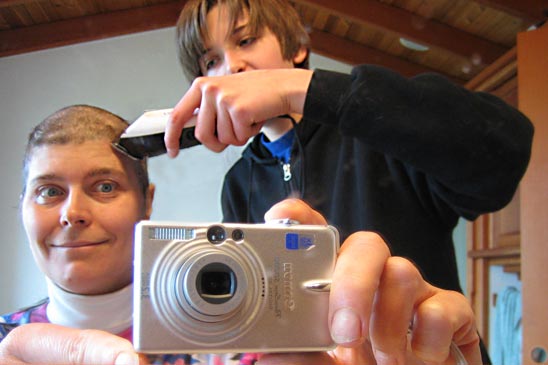
My cancer, deceptively small, just 1.4 centimetres in one breast with no lymph nodes affected, was classified as Type 1, Grade 3, invasive carcinoma, estrogen and HER2 positive. This all means that the tumour was fast-growing and carried a high risk of spreading; also that my own female hormones served as fuel for the cancer’s growth. The disease was caught just in time as cancerous cells, viewed under the microscope, were attacking blood vessels (inconclusive that they were successful). As well pre-cancerous cells fringed the tumour. You can imagine that my desire to survive this ordeal was as strong as that of my mother. I was treated with the excellent standard-of-care extended by the British Columbia Cancer Agency and I also embraced a few holistic efforts. Above all, I did not dwell upon my illness and acted just too busy to be sick, which was in fact the truth.
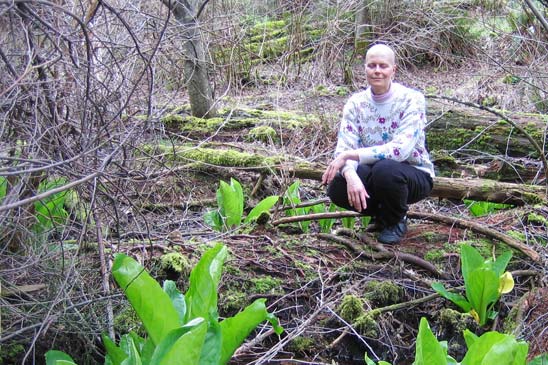
My treatment was...
Lumpectomy: Initially having been told that survival rates were no higher whether I had a mastectomy or lumpectomy, I selected the latter. I’m very happy with this decision, as I feel quite normal and have little visual reminders of the surgery.
Chemotherapy: I received two sets of drugs, four sessions of each, followed by 13 sessions of the final drug. All were administered intravenously at the cancer clinic over an 18-month period. Each was a half to full day in length. Usually while receiving the medication via slow-drip IV, I caught up on email correspondence having brought along my laptop computer. The second set of drugs, however, gave me bad feelings in my legs. To remedy this, while hooked up to the intravenous apparatus, I actually danced on the spot listening via a headset to traditional, ethnic music. This distraction and movement greatly helped me while amusing the nurses and other patients! The final drug required pre-medication to prevent a potential allergic reaction. These pre-meds never failed to put me to sleep for the duration of the session. This same drug affected me with the notorious “chemo brain” when you’re no longer as sharp or quick as before. It also necessitated bed-rest at home until the fatigue and joint pain diminished. I viewed the time as a sort of holiday, a luxury even, as my family really pampered me; and I could indulge in reading for pleasure. Attitude can make such a difference when dealing with such things.
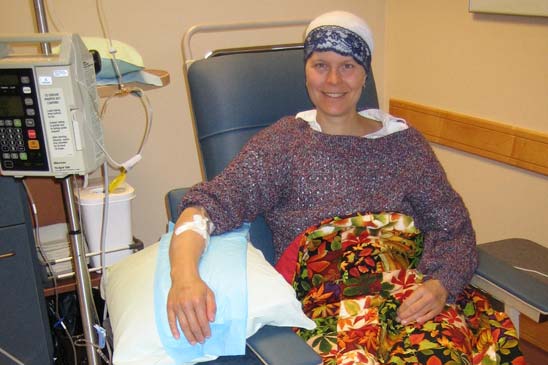
The chemotherapy should have been of a shorter duration, except that my immune system was slow to recover between sessions, the neutrophils being much too low. Given the choice of monthly injections of growth hormone to boost my blood counts or to prolong the duration between chemo sessions so as to let my body recover naturally, I decided upon the latter. The side-effects of the chemo were not too troublesome, aside from my heart losing half its pumping strength. I am fortunate that my heart, which raced wildly upon exertion, returned to normal within two years; for some people, the damage is permanent. One has to realize that there are worse things – like dying.
I rather found it interesting to have no body hair, although I really missed having no eyelashes and eyebrows. Lashes are quite handy for blinking and to prevent dust from lighting upon your eye; and you can’t imagine just how much more expressive you feel with eyebrows. You can’t “raise an eyebrow” without having a brow, for example. On the good side not having hair means never going to bed with a wet head, and a bad hair day is quite impossible. I actually found that shower water felt lovely on my bald noggin. Having photographed in Kenya, I knew that the Maasai women shave their heads upon marriage, as a right of passage, and most keep their head shaved or closely shorn thereafter. Thus I felt I could experience being bald for year or so. When my hair finally returned, it was curly. I hardly recognized myself in the mirror! Almost two years later having come to enjoy and identify with having long, bouncy waves, my normal straight hair grew in from the roots. While admittedly a twinge disappointed, I took this as a very positive sign that all was going to be okay!
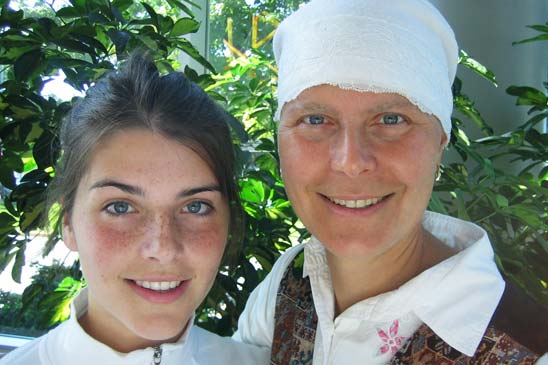
Radiation: For just over a month I received daily radiation to the affected breast. Aside from the commute by ferry and car to the cancer clinic, the radiation sessions were not problematic. Two permanent dots were tattooed on my chest as guides to accurately position the radiation beam. Today’s expertise ensures little spillage of radiation to lungs or ribs. I had received a very kind gift of a large aloe vera plant accompanied by the advice to break off a leaf to take to each radiation session. This I did. After getting “zapped”, I applied fresh aloe gel to my breast while changing out of the hospital gown. This precaution along with applying a non-allergenic moisturizing cream at home each evening, helped me avoid discolouration of the skin, burns and blisters. The skin of the irradiated breast appears and feels the same as that of the other. The purpose of the radiation was to destroy any cancer cells that may have lingered along the border of the lumpectomy surgery. I imagined the radiation to be a dose of sunshine – something my mother told me she had thought while the tumours in her bones were being radiated.
BRCA2 and More Surgery: I was unhappy to learn that my cancer is hereditary, that I carry the BRCA2 gene. Although science had not discovered this faulty gene at the time of my mom’s diagnosis, no doubt she had it too. Testing has proved that my brother also has the BRCA2 gene, increasing his risk of prostrate and breast cancer. Men do get breast cancer. With a 50% probability my brother and I have passed the BRCA2 mutation to all our offspring. Fortunately our children’s DNA can be tested, and if positive, they will benefit from early screenings and the ever-improved methods of dealing with cancer. The implications for me of being BRCA2 positive is an elevated risk of both ovarian cancer and a new breast cancer in either breast. In addition to these BRCA2 implications, I also face risk relating to the original cancer which can reoccur in the breasts or metastasize to my bones, liver, lungs and elsewhere. These realities combined with the estrogen positive characteristic of my original cancer, convinced me to accept the recommendation to have my ovaries removed. Having raised two children, and having a loving, supportive husband, and being of an age already approaching menopause, this decision didn’t seem too terrible. For prophylactic reasons, ovaries through to cervix were removed – along with a 2.5-pound fibroid I didn’t know I had! Putting a positive spin on this, the operation meant that I instantly lost weight, over a kilogram. Although many of my friends are taking hormone replacements as they reach menopause, I was cold turkey put into temporary menopause during chemotherapy, and then into permanent menopause with the removal of my ovaries. While my husband will tell you that his wife has maintained her femininity, a few adjustments regarding sex have been necessary, and so be it.
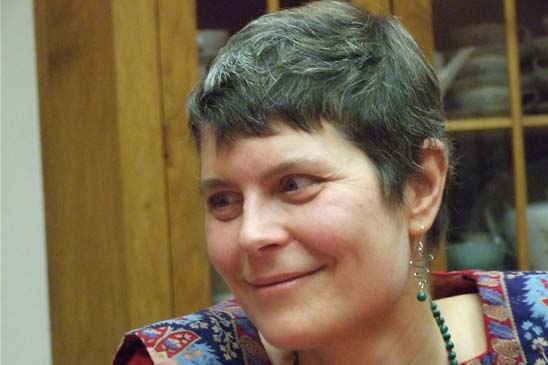
Hormone Therapy: For 5 years following the conclusion of chemotherapy, I took a daily tamoxifen pill. Tamoxifen prevents the body’s cells from absorbing estrogen. Even without ovaries, I would yet have lingering estrogen in my body. This estrogen is released from storage in fat cells and can be produced naturally from testosterone. Should any woman be prescribed tamoxifen she should be aware of the risk of uterine cancer. I have met a breast cancer survivor who was failing from uterine cancer which developed as a direct result of taking tamoxifen. My uterus had been removed simultaneous to my ovaries prior to starting tamoxifen.
Love: One of my friends wrote: “Love truly is the greatest thing. It is more therapeutic than the strongest drug, more valuable than money, more powerful than power. Love can travel through time, space, and distance. Never underestimate your ability to affect others by loving.” These are wonderful thoughts. When I was in the midst of my cancer treatments, with all these harsh chemicals flowing through my body killing off the errant cells, I started to glow with love. I was radiant, like a bride or as I was days just prior to the birth of our children. I felt that I had found the holy grail, that love was the only gift of value. Enlivened by this knowledge, my sustained energy was amazing, more than offsetting what I was going through medically. A neighbour who has outlived his prostate cancer prognosis already by several years, commented, “You’ve got to live as though you’ve only six months left. What would you do, what would you say, how would you want to be remembered?” Love, kindness, generosity of spirit – that’s my answer. I learned, however, that others were not necessarily of similar mind-set, and that receiving such expressions of love can actually cause them discomfort. Although my glow dimmed, I’ll always believe that love is to be shared and through the giving and the receiving is greatly magnified. Admittedly, I am among the most fortunate of women to have a loving husband and wonderful children, family and friends.
Holistic Alternatives: Positive thinking, good food, good exercise, sunshine, fresh air, lower stress, adequate sleep, all of this helps. I took vitamins, anti-oxidants and other natural supplements believed to boost the immune system allowing the body to fight cancer cells. Whether the supplements helped is unknown. They certainly didn’t hurt.
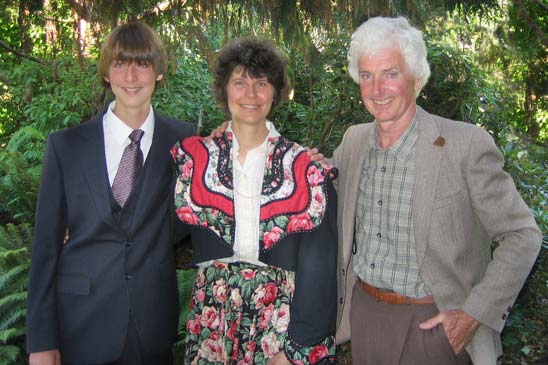
I didn’t let cancer define my life. Throughout this difficult period, my life rolled along pretty much with the same intensity. I purposefully kept myself busy so as not to dwell on the cancer. I continued to organize and host an annual festival of ethnic folk dance and also an annual symposium for The Explorers Club of which my husband and I are Fellows. One requirement for both events, my immune system being compromised, was that all participants were to arrive healthy. These gatherings are joyful, stimulating and uplifting – exactly what I thrive upon.
Professionally, my husband and I are photographers and private-press publishers of luxurious, hand-bound books featuring our imagery. To accommodate my health challenges, we made a few adjustments to our publishing program. At the time of the cancer diagnosis we were heavily involved with marketing our limited-edition tome ANTARCTICA, a task which necessitated being on the computer and phone all day, each day – definitely not my choice of lifestyle. Three decades ago when Pat and I married we developed careers that allowed us to specialize in cultural and landscape photography, among our objectives to be in the field much of the year. We both find the exploration and creative process associated with our genre of photography to be most satisfying. During the acute phase of the cancer treatments, I just knew for my well-being that I needed to remove myself from the studio and be outdoors taking photographs. And so we did. Pat and I made the tough decision to shelve the business aspects of promoting our existing tome ANTARCTICA, and instead to move forward with the final phase of photography for a body-of-work we had been involved with for many years, this being LABYRINTH SUBLIME: THE INSIDE PASSAGE. Geographically this worked for us. The Inside Passage is the maritime maze that stretches between Seattle and Alaska, and is also where we live. We were able to explore the region while returning to the cancer clinic for chemotherapy treatments. Unlike other parts of the world where we photograph, the Pacific Northwest is free of malaria, yellow fever, and so on, which was important as my immune system continued to be compromised during this period. Best of all, I was actively doing what made me most happy – seeking the aesthetics of our world together with Pat all the while enjoying glaciers, mountains, the sea, bear, wolves and whales, and meeting people from all walks of life.
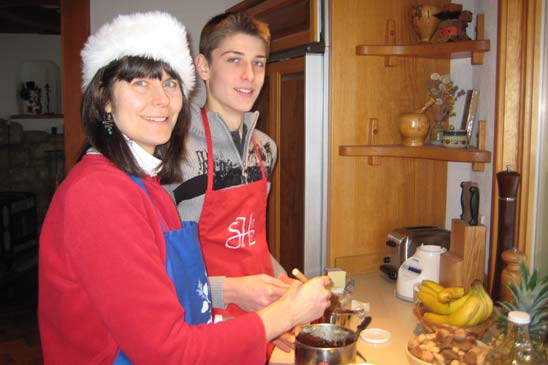
I am encouraged for the future....
Thus far, ten years following diagnosis and four years since the end of treatment, all is fine. My semi-annual check-ups – a rotation of mammograms and MRI breast scans – continue to be clear. I have no untoward symptoms that would indicate metastases of the original breast cancer causing tumour growth elsewhere in my body. Every year that passes gives me additional confidence.
When I learned of my illness, I was informed of the aggressive nature of this cancer. Four-year survival statistics were discouraging. As such, I was particularly grateful to be among the first women in Canada to receive trastuzumab (Herceptin). This powerful and effective drug had just come out of clinical trials having proven to significantly increase survival rates for those whose cancers are specifically HER2 positive, as mine was. This drug was unknown at the time of my mother’s cancer. Taxol, another drug of which I benefited, was originally derived from the bark of the Pacific Yew tree. This drug was in clinical trials when mom was yet alive, unavailable to her. Since my mother’s passing, efficient methods have been developed to analyze DNA from blood samples to identify BRCA1 and BRCA2 mutations. For people with these genes, including members of my family, voluntary participation in hereditary cancer programs facilitates early detection of a potential cancer. Early treatment of cancer enhances one’s chances for a long, healthy life. Looking further to the future, I fully suspect science will find a way to deactivate the BRCA genes and neutralize their proclivity to foster cancer.
Now, at age 56, having outlived my mother, I am conscious that I am enjoying bonus years. I feel deep gratitude for today’s medicine, for the love of my family and friends, and for the positive attitude instilled during my childhood. I consider each day to be a blessing. I endeavour to be generous, loving and kind.